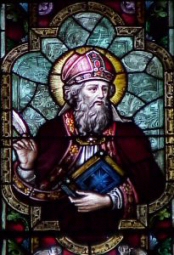
Enchiridion On Faith, Hope and Love
by Saint Augustine
CHAPTER XI
THE INCARNATION AS PRIME EXAMPLE OF THE ACTION OF GOD'S GRACE
36. In this the grace of God is supremely manifest, commended in grand and
visible fashion; for what had the human nature in the man Christ merited, that it,
and no other, should be assumed into the unity of the Person of the only Son of God?
What good will, what zealous strivings, what good works preceded this assumption
by which that particular man deserved to become one Person with God? Was he a
70John 1:14.
71Rom. 3:20.
72Epistle CXXXVII, written in 412 in reply to a list of queries sent to Augustine by the proconsul of
Africa.
73John 1:1.
74Phil. 2:6, 7.
75These metaphors for contrasting the "two natures" of Jesus Christ were favorite figures of speech
in Augustine's Christological thought. Cf. On the Gospel of John, Tractate 78; On the Trinity, I, 7; II,
2; IV, 19-20; VII, 3; New Testament Sermons, 76, 14.
man before the union, and was this singular grace given him as to one particularly
deserving before God? Of course not! For, from the moment he began to be a man,
that man began to be nothing other than God's Son, the only Son, and this because
the Word of God assuming him became flesh, yet still assuredly remained God. Just
as every man is a personal unity--that is, a unity of rational soul and flesh--so also
is Christ a personal unity: Word and man.
Why should there be such great glory to a human nature--and this
undoubtedly an act of grace, no merit preceding unless it be that those who consider
such a question faithfully and soberly might have here a clear manifestation of
God's great and sole grace, and this in order that they might understand how they
themselves are justified from their sins by the selfsame grace which made it so that
the man Christ had no power to sin? Thus indeed the angel hailed his mother when
announcing to her the future birth: "Hail," he said, "full of grace." And shortly
thereafter, "You have found favor with God."76 And this was said of her, that she
was full of grace, since she was to be mother of her Lord, indeed the Lord of all. Yet,
concerning Christ himself, when the Evangelist John said, "And the Word became
flesh and dwelt among us," he added, "and we beheld his glory, a glory as of the only
Son of the Father, full of grace and truth."77 When he said, "The Word was made
flesh," this means, "Full of grace." When he also said, "The glory of the only begotten
of the Father," this means, "Full of truth." Indeed it was Truth himself, God's only
begotten Son--and, again, this not by grace but by nature--who, by grace, assumed
human nature into such a personal unity that he himself became the Son of Man as
well.
37. This same Jesus Christ, God's one and only Son our Lord, was born of the
Holy Spirit and the Virgin Mary. Now obviously the Holy Spirit is God's gift, a gift
that is itself equal to the Giver; wherefore the Holy Spirit is God also, not inferior to
the Father and the Son. Now what does this mean, that Christ's birth in respect to
his human nature was of the Holy Spirit, save that this was itself also a work of
grace?
For when the Virgin asked of the angel the manner by which what he
announced would come to pass (since she had known no man), the angel answered:
"The Holy Spirit shall come upon you and the power of the Most High shall
overshadow you; therefore the Holy One which shall be born of you shall be called
the Son of God."78 And when Joseph wished to put her away, suspecting adultery
(since he knew she was not pregnant by him), he received a similar answer from the
angel: "Do not fear to take Mary as your wife; for that which is conceived in her is of
the Holy Spirit"79--that is, "What you suspect is from another man is of the Holy
Spirit."

 Keep Site Running
Keep Site Running